English Words in Action, Group F
(a variety of English words which have developed through history and are currently used in our modern age)
Simply click on this banner (or the following link) and you will be on your way to stimulate your brain for greater word comprehension with quizzes based on some of the words in this unit.
2. A fanciful and factitious story, a fabrication: That story about Mike's pirate ancestor is probably nothing more than a fable.
3. Etymology: from Latin fari, "to speak" (our words fame and fate are from the same root). Greek phama "fame", and phanai, "to speak", are also related to the Latin elements.
2. A showy, artificial, or deceptive misrepresentation intended to conceal something unpleasant or a superficial appearance or illusion of something: Somehow Sam's company managed to maintain a facade of wealth and well-being despite their financial losses.
Henry could sense the hostility that was lurking behind Mildred's polite facade.
3. Etymology: "front of a building" from French façade, from Italian facciata; from faccia, "face"; from Vulgar (Common) Latin facia, "face".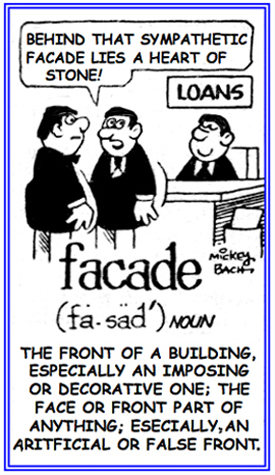
Go to this Word A Day Revisited Index
so you can see more of Mickey Bach's cartoons.
2. Etymology: from French and Spanish fanfarron, "braggart"; Italian fanfano, "babbler, an excessive talker".
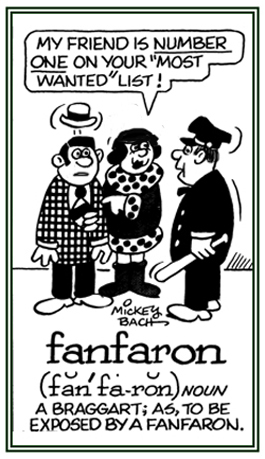
Go to this Word A Day Revisited Index
so you can see more of Mickey Bach's cartoons.
2. A man who creates, originates, or founds something: There are those who say that George Washington was the father of his country.
3. When capitalized, a term that is used when talking to or about a priest; especially, a Roman Catholic priest: Father is used when greeting or talking with priests in the Roman Catholic Church or the Orthodox Catholic Church; while "Padre" is often used in the military.
2. To get to the bottom of; to manage or to comprehend a problem etc.: Mike couldn't fathom why his daughter decided not to wear a warmer coat on such a cold day.
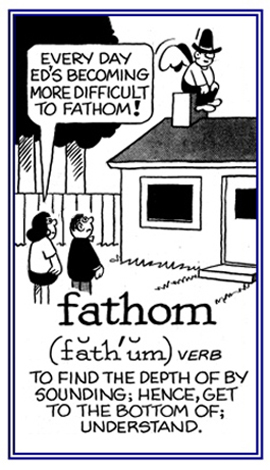
Go to this Word A Day Revisited Index
so you can see more of Mickey Bach's cartoons.
Jane's fatuous ideas about what her friends should do during the bad economy were ridiculous.
2. Etymology: from Latin fatuous, "foolish".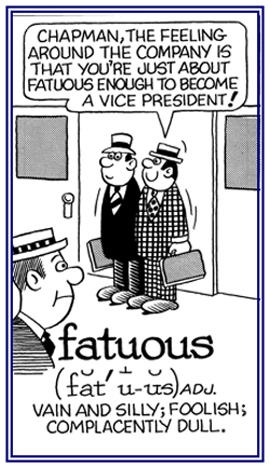
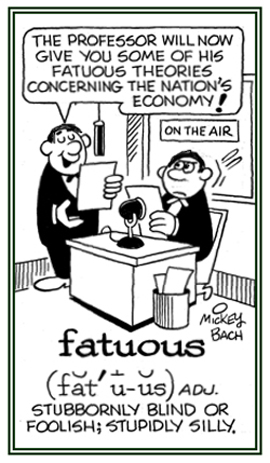
Go to this Word A Day Revisited Index
so you can see more of Mickey Bach's cartoons.
Lina actually enjoyed being fawned on by her fans.
2. To give a servile display of exaggerated flattery of affection, typically in order to gain favor or an advantage: Some of the employees fawn over the president of the company whenever he appears in person in their work areas.Some politicians have been known to fawn over anyone with money who is willing to support their campaigns.
When the Hollywood stars entered the hotel, the employees were giving more fawning services than they usually do for other famous people.
The wealthy man was surrounded by a group of fawning company representatives in order to encourage him to invest in their business.
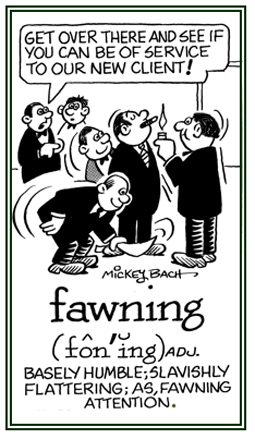
Go to this Word A Day Revisited Index
so you can see more of Mickey Bach's cartoons.
David’s teacher told his English class that the verb faze had several negative meanings; for example: disconcert, fret, disturb, perturb, worry, upset, etc.
A common error that some people make is to spell faze as "phase" and so everyone should be aware that these terms have completely different meanings!
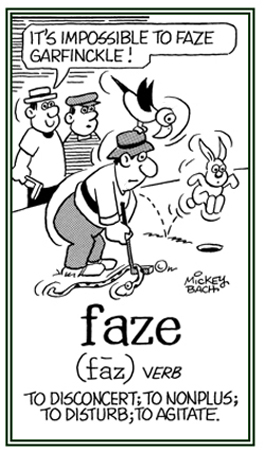
Go to this Word A Day Revisited Index
so you can see more of Mickey Bach's cartoons.
2. Those who have committed a more serious crime than those designated as misdemeanors; for example, aggravated assault as contrasted with a simple assault or a misdemeanor: Although the man was convicted as a felon, he protested his innocence.
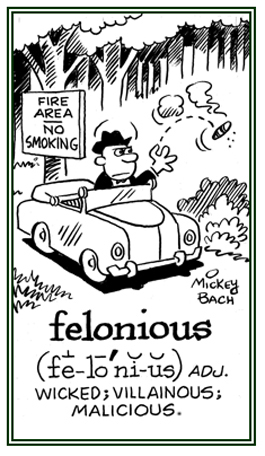
Go to this Word A Day Revisited Index
so you can see more of Mickey Bach's cartoons.
Links to all of the groups of English words in action, Groups A to Z.
You may see the bibliographic list of sources of information for these words in action.

